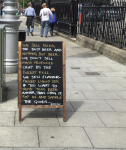Dermott Hayes's Blog: Postcard from a Pigeon, page 61
July 20, 2016
Signs of the Time #12
Random Signs Week…just a collection of signs I’ve picked up, with my trusty iPhone 6 to hand and some I’ve borrowed from other, well tuned, observers.
A cobble stoned lane in Dublin’s city centre, imagine the calls home, ‘something’s come up’ or ‘I’m tied up.’

And then, inside a church on the west coast…an Amazing Place

Ronan Quinlan (quinlan.ie)
Follow the directions, carefully, it could lead to a …dead end.

Ronan Quinlan (quinlan.ie)
And now your mind is suitably boggled, maybe this will show you the way…


Can’t read that one? Maybe you’ve lost something?

And for the beer goggled among you, here’s that one (above) again.



Signs of the Time #11
Random Signs Week…just a collection of signs I’ve picked up, with my trusty iPhone 6 to hand and some I’ve borrowed from other, well tuned, observers.
A cobble stoned lane in Dublin’s city centre, imagine the calls home, ‘something’s come up’ or ‘I’m tied up.’

And then, inside a church on the west coast…an Amazing Place

Ronan Quinlan (quinlan.ie)
Follow the directions, carefully, it could lead to a …dead end.

Ronan Quinlan (quinlan.ie)
And now your mind is suitably boggled, maybe this will show you the way…


Can’t read that one? Maybe you’ve lost something?

And for the beer goggled among you, here’s that one (above) again.



July 19, 2016
Zebra Feet Syndrome

I’m trying to rid my feet of the dreaded, but little known, Zebra Feet Syndrome. It is caused by the excessive wearing of Jesus boots, or sandals, as they’re better known. You can see my efforts are beginning to bear fruit with the blossoming of lurid pink strips where there was once the lurid stripe of pale, white flesh.
Still, it could be worse. I’ve vowed not to venture out today, although if this pressure cooker heatwave persists, I could make a sortie to the off license to replenish my diminishing stock of cold beer.
Meanwhile, the reading goes on. Having just finished John McEntee’s hilarious I’m Not One to Gossip, But…and Tanya Cliff’s Tales of the Valderan: The Prodigal Son. I’ve started reading The Journal of Bram Stoker, drawn from the manuscript of the Irishman’s personal diary, found ten years ago in the Isle of Man attic of his great grandson. I’m also toying with a return to James Lee Burke’s Cadillac Jukebox or Darrell Figgis’s short history of Irish dramatist, artist and poet, AE Russell. Those are the paperbacks, I’ve also got Kent Wayne’s Echo: Volume I and PS Bartlett and Ronovan Hester’s Amber Wake on my Kindle. I’m spoiled for choice.



Book Review: I’m Not One to Gossip, But…

John McEntee, diarist extraordinaire and his brother, Myles at the launch of I’m Not One to Gossip, But…
As someone with experience on the front line of social diary gossip writing, my hat’s off to John McEntee, who, as Jilly Cooper writes on the cover of his gloriously outrageous memoir, ‘is one of the funniest men in the world.’
With all the rapier wit he’s used for the past thirty years writing some of the most celebrated diaries and gossip columns in British newspapers, McEntee, an Irish Catholic from a rural Irish backwater, cuts a swathe through the pompous, the deluded and the overbearing.
Always dapper, incorrigibly well mannered in the face of boorish yobbery on a grand scale, John scythes a path through the English establishment, the wigged and frocked upper class twits in control of Britain’s media empires, with a notebook in one hand and a tasty tipple in the other.
The great and the good occupy these pages, indeed, they gather and queue, like supplicants at the court of a medieval despot, they crowd the halls and corridors, seeking, desperately, a fleeting grasp on the reins of power, while McEntee, the interloping jester, scoffs and scorns and ridicules their pretensions. If Indiscretion wasn’t his middle name, it should’ve been.
John began his career in the Anglo-Celt in Cavan, where his father was deputy editor. He moved from there to the Irish Press, my own alma mater, so to speak. In 1975 he moved to the London office and from there, began supplementing his meagre Press group stipend by selling gossip items to the tabloid diarists.
He made many enemies but far more friends and among these he counted Sir Terry Wogan, Keith Waterhouse, Richard Harris, Jilly Cooper and Anne Robinson, to name just a very few.
To say this book is funny is such a gross understatement, it cannot explain the aching pain I’ve experienced reading it or the suspicion, at times, I should desist while I go out and procure a pair of adult incontinence pants.
Mischief, some people call it and perhaps their right. It was certainly not malicious. At times, John reveals the decency and humanity that underscores his dealings with the world, as he sits, for example with the tearful wife of British comedian, Tommy Cooper, shielding her through an afternoon of wrenching grief, from a stream of well meaning well wishers and then shielding the widow’s grief from tabloid exposure by telling his editor he hadn’t seen her.
I’m Not One to Gossip, But…,in another age and not so long ago, either, would be cited as essential reading for any newsroom rookie or copy boy, even it was as a warning to them that there but for the grace of some diligent work and a watchful editor, go they. Now, it is the chronicle of a time and style of journalism that is gone, forever.



July 18, 2016
Ladies in the Blues

Highlight of the weekend was LADIES IN THE BLUES, a spectacular, opening night stage production, featuring four female singers and a cracking band of blues’ sidemen performing songs written and recorded by women in the history of the blues.
It features Flo McSweeney, one of Ireland’s best known female vocalists who has worked with cutting edge rock, blues and jazz bands in the past; Emma Nicolai, a singer/songwriter who aides from recording and performing her own music, is also a session singer with some well known bands; Jhil Quinn, who fronts her own Rhythm and Roots Band and is the third generation in a family of singers and performers and Clara Rose, a well known blues, rock and folk performer who has recorded best selling albums of her own compositions.
The show got its first public showing to a sell out crowd in Bray’s Mermaid Theatre on Saturday night.
Backing them is a line up of four of Ireland’s finest blues’ sidemen, Ed Deane on Guitar, James Delaney on keyboards, Garvan Gallagher on bass and Kevin Malone, drums, who, between them have played with Frankie Miller, Donovan, Dana Gillespie, Shane McGowan, Henry McCullough, Rory Gallagher, Van Morrison, Chuck Berry, Steve Earle, Jackson Browne, The Fleadh Cowboys, Mary Black Band and Don Baker’s Blues Band, to name a few.
A show of two halves, it features towering solo performances of blues’ classics like ‘Natural Woman’, ‘Georgia On My Mind’, ‘I Put a Spell on You’, ‘Black Coffee’, ‘St James’ Infirmary’ and ‘Cry Me a River’, as well as composite numbers where all four singers brought their very distinct talents to the game, in attitude and harmonies.
Flo McSweeney is the classic blues ballad singer who gave us renditions of favourites by Billie Holliday and Julie London; the smouldering Emma Nicolai was an uncanny Nina Simone, Clara rose took the songs of Janis Joplin and Sister Rosetta Tharpe and owned them while Jhil Quinn mined the archives of the blues, reviving the pioneering songs of Mamie Smith, Memphis Minnie and other pioneers. In between, we got Ella Fitzgerald, Etta James, Bonnie Raitt, Ethel Walters and Aretha Franklin and a whole host of others as backdrop bios were lowered, backstage, reflecting the background and impact of these ladies in turning the blues from a dive bar entertainment to a new art form for theatres and concert halls.
I could see this show travelling. Don’t forget, you read it here, first.
http://www.ladiesintheblues.com/


July 14, 2016
Fox in the Henhouse
Just months after the successful 2012 Olympics, Justine Greening – the new Education Secretary – backed the sell-off of six tennis courts, a football pitch and a playground belonging a local school in her Putney constituency, of which she was a governor: Justine Greening in school playing fields row Just months after the sale, the school […]


July 13, 2016
Why Me?
#WQWWC – Writers Quote Wednesday Writing Challenge – Memories

“What the fuck are you smiling at, Tommy, you look like the cat’s got the cream?”
Tommy carries on, oblivious, his smile, a secret smile, he thinks. Everybody thinks they have a right to know your business but are too quick to tell you to fuck off, if you get in their’s.
Tommy’s got news, from the doctor in the community medical centre and for that news he’s smiling. Why? because he’s dying, that’s why and that’s enough to make me smile, he’s thinking.
And why would he want to tell any eedgit in the street? he thinks, knowing the question is no more important than the answer to them but, in the language of these mean streets, it’s a way inside your head, your pocket and with any luck, your bottle.
And speaking of bottles, Tommy does have one, hidden away this morning, knowing he’ll need it later, he wants it now, that bottle, but first, he has to lose the entourage.
He glances, swiftly, over his shoulder and there’s at least three of them, closing on him like a moving target they’re trying to focus on; Phonsie, the fucking eedgit who asked the question, shuffles after him, leering, a slime of grey drool, hanging from the edge of his unshaven chin, one eye, half shut and bruised, from falling or fighting, or both, his clothes a jumble of charity offcasts, the running shoes, incongruously new; Mary, a sharp, purple faced harridan, her hair a knot of unkempt grey, shoulder length, her teeth, once like sawtooth serrations, now yellow, gapped and broken and George, tall, thin and once, distinguished, now desperate, craven and beaten, without a trace or shadow of the dignity he once wore, like a badge.
All they know is Tommy’s smiling so Tommy’s got a bottle.
And all Tommy knows is that bottle’s for him and him, alone.
Five metres ahead of them, he quickens his pace, steps, deftly, into a side street where he breaks into a run, through a gap in a fence and out across a vacant lot of scrub and demolition waste.
Everybody knows Tommy, he’s thinking, when he has a bottle, they’re like flies around shite.
Tommy slows down. He’s short of breath, his clothes stuck to him, stained by sweat and ingrained dirt. His feet hurt. There’s a tightness in his chest he wants to ignore. He’ll get that bottle first. It’ll settle him, better than the pills the doctor prescribed, he’s thinking, tapping the script, folded scrappily, in his trouser pocket.
Then he’s at his hiding place where he stashed his bottle only that morning. But there’s five young fellas here, boys from the neighbourhood, he recognises, because he knew their fathers. He slows himself, looks away and down at the ground. He’ll walk past them slowly and they won’t notice me. He can come back, he thinks. He can smell the weed they’re smoking as they pass a flagon of cheap cider, between them. He hopes he’s invisible. It’s worked before, he thinks.
Not this time. ‘Well, Tommy. Is that you, Tommy?’
He keeps staring at his feet as they pass before him, his feet, that is. Don’t answer, stay invisible, he thinks.
‘Hey, Tommy. Tommy Guns. I’m talking to you.’
One of them steps in front of him, blocking his progress. He keeps his eyes on his toes, his own toes. Stay invisible, he thinks.
‘I’m talking t’ye, Tommy Guns, ye stinkin’ wino.’ This one puts his hands on him, a flat hand on his chest, halting his progress, entirely.
‘D’ye know this is the famous Tommy Guns, boys, the one that got away, the hired killer who never got caught?’
‘Except by a bottle of Dago red,’ one of the others answers and the rest of them laugh and whoop.
‘Careful there, Jimmy, he might be packing,’ one of them goads Jimmy, the one who has stopped him and put his hands on him.
Tommy feels his head split apart, bone and cartilage grind and splinter, blood and spittle splash, sticky and wet. He feels a whoosh as his breath leaves his chest, the kick has hit him mid-sternum, causing as much discomfort, he knows, to his attacker as himself.
Now they’re standing around him as one pours the last drop of the cider on his head while another relieves himself. Tommy stays quiet, stares at a tiny square foot patch in the dust, blood and piss stained pool before him. He hears their steps recede and waits.
Satisfied, he stands up, shrugs and disappears inside the shell of the building, roots in a corner, upends a loose patch of floorboard, reaches inside and scrabbles about before emerging with half a bottle of whiskey. He slumps back in the corner, ignoring the reek of piss, his splintered nose, the smudge and smear of blood, sweat and snot on his face. He bites the cork from the bottle and in one fluid move, swigs and gulps its fiery, amber content.
He shuts his eyes tight and remembers. A young soldier, pimple faced, hardly shaving, sitting in the back of an army patrol vehicle and he, in a hooded parka, holding the nine millimetre Parabellum, emerging from the shadows and pointing it into the face of that boy his own age, who stared at him and said, ‘why me?’ before he shot him.

Tears run down Tommy’s messed up face, tossing his head about, violently, as though to cast the memories from his mind. Death will come soon, oblivion, he believes, is at the end of the bottle.


I’m Not One to Gossip, But…
EXCLUSIVE…EXCLUSIVE…EXCLUSIVE…EXCLUSIVE…EXCLUSIVE…EXCLUSIVE…EXCLUSIVE …What the Daily Mail Refused to publish
Having worked in the business of social diarist/gossip columnist myself for many years, there are a few journalists I would’ve considered the ‘Mr Miyagi‘ to my ‘Gossip Kid.‘ John McEntee, who has worked at various times in his career for the now defunct Irish Press, The Sun, Daily Express and Daily Mail, is one of them. A book of his career as a social diarist, ‘I’m Not One to Gossip, But…’ will be published in London and Dublin, this week. This is an adaptation, published here, exclusively, John expected the Daily Mail would publish this week but it was withdrawn by ‘Mail editor, Paul Dacre, on the grounds that it gave journalism a bad name, a classic case of mistaken identity between Pot and Kettle.

by John McEntee
The duty of every gossip columnist, however mischievous and trouble-making, is to tell the truth. So I cannot tell a lie and say that Sir Sean Connery is a generous man. He is never, shall we say, free with his money.
Just how tight he can be I discovered at a ‘first night’ party in 1996 for his wife Micheline’s hit play, Art. I was there as part of London’s cohort of freeloaders, and as such it was my duty to spout congratulations and praise to the stars’s faces, in exchange for the free drinks that are a crucial part of these shindigs.
I elbowed my way over to the actors Tom Courtenay and Albert Finney, who should have been beaming, since they were headlining the play. But they were both scowling. ‘Can you believe it?’ bellowed Finney at me. ‘I had to pay cash for our drinks. Connery has installed a pay-bar.’
At first I didn’t believe him, but it was no exaggeration: Albert’s two sisters had travelled all the way from Leeds to see their brother in this production, and when he ordered a round of drinks for them he was told he would have to pay.
This could not go unreported. Seeking a comment from the host, I pushed my way over to Sir Sean, who was flanked by two po-faced hunks of raw beef in tuxedos. I introduced myself and told him, ‘Albert Finney is complaining that he had to pay for his sisters’ drinks. Why have you installed a pay bar?’
Connery blinked. His lips formed an unmistakeable sneer. He made eye contact with one of the jumbo tuxedos, and I felt firm hands under my armpits as my feet left the floor. The last thing I saw as I was propelled through the door onto the gravel outside was Sir Sean’s grinning face.
Such treatment was, I mused, an occupational hazard. My journalistic career had been peppered with dubious incidents from the start. There was Pope John Paul’s visit to Ireland in 1979, for instance: working for the Irish Press, I was sent to cover the Pontiff’s pilgrimage to the shrine at Knock in County Mayo. The whole country had gone Pope-crazy – a million people flocked to see him at Phoenix Park in Dublin, where a fortune was made by chancers selling folding canvas stools at outrageous prices.
I was assigned to cover the mass for the sick in Knock’s impressive, round Basilica, but the organisers decided that only the sick themselves, with their relatives, should be allowed to attend. No press.
In a bar, I acquired a wheelchair, a rug and a chauffeur for £20. Haggling took some time, during which my ‘carer’ and I downed four pints of Guinness apiece. I was wheeled to the steps of the altar, where I had my first shivers of self-doubt: to my right was a child on a hospital bed festooned with drips and other life support equipment, while to my left an extremely frail lady was slumped asleep in her chair.
I had another, more urgent matter on my mind, as the papal helicopter hovered overhead. Pope John Paul was already two hours late, and those four pints of Guinness were taking their toll. As the Mass proceeded, I squirmed in my wheelchair. Sweat appeared on my upper lip. If I hadn’t been unwell before the papal visit, I was now.
At last the service was over, and the rock-star Pope was down among the beds and crutches, embracing children and clutching hands. I felt my fingers being squeezed, and my discomfort was overcome by something even stronger – an overwhelming guilt. What on earth was I doing, masquerading as an invalid among so many genuinely sick people? The answer was: my job.
Not every story I investigated was quite so piously spiritual. My news editor sent me to Ambleside Avenue in Streatham, London, to interview Cynthia Payne, the brothel-keeper famously dubbed Madame Cyn. She answered the front door with a twinkle in her eye and before I had time to introduce myself slid her right hand, palm upwards, between the legs of my Prince of Wales checked trousers. ‘Oooh,’ she chuckled, ‘you’re a big boy, come in.’
What followed was a very raucous shindig with her working girls and curious customers, in a home of overwhelming suburban ordinariness, with nets at the windows, starched antimacassars and plenty of pretty china. It was 1982 and Madame Cyn had recently published a memoir, An English Madam, about her business: until her arrest and imprisonment for running ‘the biggest disorderly house’ in British history, she had provided mature clients (no one under 40 was admitted) with a lavish buffet, plenty of wine and the company of a young lady, all for £25.
Her customers, many of them members of the Houses of Parliament and captains of industry, usually eschewed conventional intercourse, and preferred bondage, whipping, spanking – one delighted in being stripped, covered in honey and having one of Cynthia’s ladies switch a vacuum cleaner from suck to blow, thus pebble-dashing him with household dust.
The girls received £8 for each sexual chore, and invariably finished their shift with a snack of poached egg on toast and a cup of tea.
We chose a quiet room for the interview but, by the time we’d finished chatting, a party was in full swing around us. I had noticed on my way in an ice-laden bath filled with bottles of wine, vodka, brandy, Pernod and sherry. I stayed far too long, talking to a PVC-clad man with a leather balaclava and pointed breasts, and a bewhiskered ex-RAF wing commander who told me his pleasure was to be tied naked to a tree in Epping Forest by Cynthia’s girls and abandoned till nightfall – the risk of discovery thrilled him.
In such distracting company, I failed to notice the winking camera in the corner of the room. TV reporter John Stapleton was recording a piece for that evening’s Newsnight, and by the time I arrived home the show was just starting on BBC2. My long-suffering wife was staring at the pictures. As John talked to camera, I was in full view behind him, throwing back my head with laughter at the bondage aficionado’s jokes. ‘That’s you!’ my wife exclaimed. ‘Where have you been?’ My answer was to mumble gibberish.
I didn’t always heap shame upon myself. At the Sun in 1984, I was despatched to secure an interview with Tommy Cooper’s widow, the day after he crumpled and died on the stage of Her Majesty’s Theatre in the West End. Laden with flowers, not to mention the glow from four foaming pints of London Pride ale which I had imbibed as a precaution, I rang the doorbell in Chiswick High Street.
A Filipino maid answered the door and announced that Mrs Cooper was not seeing anyone, but behind her I saw a pair of red-rimmed eyes blinking behind enormous spectacles, and the grey hair of Mrs Cooper herself. ‘What lovely flowers,’ she said, and I asked if she would accept them as a token of sympathy from our readers.
She ushered me inside. At the foot of the stairs was a large wooden trunk bound with leather straps, containing Tommy’s props. On top of it was half a sliced loaf. Mrs Cooper – ‘Call me Dove,’ she said – pointed and explained, ‘It’s Tommy’s banana sandwiches. He always took a whole loaf of them when he was on stage.’ She dissolved in floods of tears and added, ‘He’s only eaten half of them.’
She asked me to pour her a large Gordon’s gin with Schweppes tonic water, and to have one myself. As I did, the phone rang. It was Tommy’s fellow comic Eric Morecambe, paying his respects. Dove shook her head: she didn’t want to take the call. ‘Mrs Cooper is indisposed,’ I told Eric.
Over the next few hours I fielded calls from Michael Parkinson, Eric Sykes, Ronnie Barker, Barry Cryer and a profusion of Tommy’s other acquaintances. Dove asked me to watch the video of his last performance from the night before, and she replayed the moment that he collapsed repeatedly, howling and babbling: ‘He never even finished his banana sandwiches!’
When I returned to the newsroom much later, the newseditor asked me how I’d got on. ‘She wouldn’t talk to me,’ I lied. I just didn’t have the heart to write it up.
No less odd, in its own way, was my meeting with the self-professed medium, and well-meaning charlatan, Doris Stokes. I visited her council flat off the Fulham Road where she lived with her husband, John. Their sitting room was dominated by a chunky armchair and a large sofa positioned before the TV, but what caught my attention was a square of cheap wood on the wall, topped with a triangle and a crucifix.
Inside the square was a noticeboard-style jumble of more than 100 snapshots, some culing upwards, others pinned down, many yellowing at the edges. All of them were of children. Pre-teens in Boy Scout and Girl Guide outfits. Others caught in the glare of sunshine on family hlidays in Clacton, Eastbourne, Spain, Florida and other places. All smiling, all happy… all now dead, I realised. I asked Doris who they were. ‘Oh, these are my spirit children,’ she assured me. ‘I am in touch with them all.’
Distraught parents, despairing of conventional religion, would send their photos to Doris, and she would ‘make contact’ and report back to the families that their offspring, cruelly taken from them before life could really begin, were fine and happy on the other side. As far as I know, no money changed hands. I don’t believe Doris did any harm, and she gave more comfort than a Vatican-full of monseigneurs waving rosaries ever could.
Sometimes harm could inadvertently be done by an item in the gossip column, however. Soon after I joined the Evening Standard, a story did the rounds that one of the Brink’s-MAT bullion robbers had been stepping out with a girl who worked in the Harrods perfumery department. We had heard other allegations that wealthy Arabs would sometimes come away from the Knightsbridge emporium clutching phone numbers scribbled on the receipts for jumbo bottles of Chanel, so I was sent to talk to the girls.
It was easy to strike up a conversation with the ladies in the perfume hall and, as we chatted lightly, it never crossed my mind to reveal to these attractive and delightful women that I was a reporter. But after my piece appeared, I received a telephone call: ‘My name is Ann. I used to work at Harrods – but we’ve all been fired and told to leave immediately because of you. I’m a single mother, I can’t afford to lose this job.’ By now she was in tears.
I was appalled, and so was the managing editor – Harrod’s had withdrawn their multi-million pound advertising account in protest.
But even that disaster was no match for an early assignment, in 1974, when I interviewed the oldest man in Ireland. His name was Jeremiah McCarthy, he was 107 and he lived in County Kilkenny. He had also, his daughter told me and the photographer, Ray, been confined to his bed for two years. He wasn’t suffering from any particular ailment, but age had slowed him down.
At my pleading, however, Jeremiah rose from his bed and joined us outside, in a starched grey woollen suit with creases in the trousers that were sharp enough to shave with. He was a slight figure, wearing a felt trilby and clutching a stout walking stick in each hand. He was also completely deaf, but we managed to persuade him to stand in the open doorway of his cottage while Ray snapped pictures from the roadway.
It was a winter’s day and, by the time we had finished, Jeremiah was turning blue. I helped him shuffle back inside and he took an age, with the cold wind whipping round us. The old man was muttering something. I asked him to repeat it: ‘I’d be a long time walking to Dublin,’ he said.
Two days later, I saw Jeremiah’s portrait on the front of the Evening Press. The headline said, ‘Ireland’s Oldest Man Dies.’ He’d caught a chill after leaving his bed for the first time in two years. To this day, colleagues point me out as ‘the man who killed the oldest man in Ireland’.
Such tragedies are less rare than you’d think. When a new clock was installed on top of the Express building in the Nineties, it was unveiled by former Doctor Who Jon Pertwee. Though it was perishing cold and the actor’s teeth were chattering, the photographer insisted he must pose for one more picture with a dalek on Blackfriar’s Bridge, with the clock in the background. The ex-Time Lord obliged, despite the cold, and was dead within a week.
With so many perils and pitfalls, you might think no one would ever wish to see their name appear in a gossip column. And you would be wrong – some are desperate for it.
One summer in the late Eighties I motored to the Grantchester home, just outside Cambridge, of Jeffrey and Mary Archer, for a book launch – not one of Jeffrey’s potboilers, but a privately published volume by his fragrant wife about the poet Rupert Brooke, who had once lived in the house that was now theirs.
Mary had chosen an occasion when her husband was away on the political campaign trail, because she didn’t want him hogging her limelight. She looked less than pleased when, a few minutes into the event, we heard the scrunch of tyres on the gravel drive. Jeffrey had come racing back. Mary’s face betrayed exactly what she thought about this.
Jeffrey was wearing a straw boater and striped blazer, and brandishing a painting which he announced to all and sundry was a surprise gift for his wife. Mary looked bemused, glanced at it briefly and placed it carelessly on the lawn. Then she resumed the business of publicising her book, clutching a copy as she posed on a bench for the photographers.
Behind her, Jeffrey launched into a shameless bout of attention-seeking. He was kicking his legs up, like Frankie Vaughan, and waving his hat about.
Mrs Archer turned round, mouthed the words ‘F*** off’ at her husband and returned to the camera with the sweetest of smiles.
Adapted from I’m Not One To Gossip But… by John McEntee, published by Biteback


Signs of the Time#11
12+ Funny Voting Signs Express What People Really Think About These Elections
12+ Funny Voting Signs Express What People Really Think About These Elections
Trump and Hillary have the lowest favourability rating of practically any modern American politician, all the other Republican candidates have suspended their campaigns, and many claim that Bernie Sanders is Berning-up. What’s a voter to do during elections as troubled as these? Whose sign should grace your lawn?
Bored Panda, inspired by the “Everybody Sucks 2016” campaign, has put together this list of voting signs that either mock a certain candidate, or the whole electoral process in general. Which sign is most poignant? Vote, or submit your own hilarious voting sign pictures below!

#2 Everybody Sucks

#3 My Yard Sign Has Finally Arrived


#5 Someone Didn’t Like Trump

#6 Make America Great Again

#7 Best Political Sign Yet


#9 Best Yard Sign I’ve Seen Yet

#10 Bender 2016


#12 I, For One, Welcome Our New Transforming Robot Overlords



July 12, 2016
Ch-ch-changes
https://dailypost.wordpress.com/photo-challenges/look-up/
They say, ‘plus ça change, c’ést plus la meme chose’. Every morning when I look out from my bedroom or living room window, that’s true.







Postcard from a Pigeon
- Dermott Hayes's profile
- 4 followers



